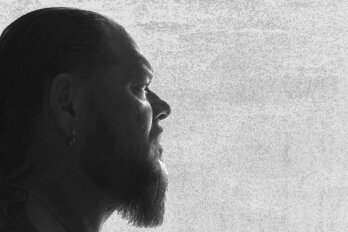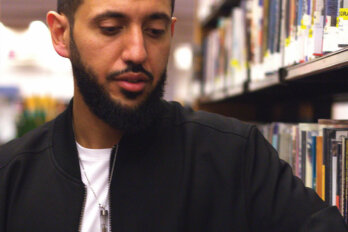This is the story of a sexual assault trial with only two witnesses: the accuser and the accused. At least one of them is lying. The other may or may not be telling the whole truth. The law states that it is possible to convict under such circumstances, even when there is no forensic evidence. But the law doesn’t make the truth easy to discern, which is why the verdict has been appealed.
Part 1: She says he raped her. He says he never touched her. At least one of them is lying
After their photography session wrapped up, Li showed Cecilia some of the pictures. And once again, their accounts of what took place next vary wildly. Li says Cecilia changed back into her black dress as soon as the photo shoot ended. But according to her, she was still wearing the skimpy yellow tank top he had given her. While they sat on the couch, Cecilia had her head near Li’s shoulder so she could look at the pictures he’d taken as he scrolled through the images on his camera. “He said something like I was quite photogenic,” she says. “He praised me.” Then, out of nowhere, she says, he began kissing her on the mouth. “I pushed him away. I said ‘What are you doing?’”
According to her version of events, he answered: “Between a photographer and models it is very common to have intimate relationships. It will produce better works of photography.” He tried to force her down. “Did you do such a thing to each and every female model you photographed?” Cecilia asked. Li replied, No—he was “quite selective.”
Cecilia brought up Catherine, the schoolmate who Li had photographed and whose pictures she had seen on his Facebook. She says Li told her that he had done nothing more than kiss Catherine because she was a virgin. “Don’t be nervous, relax, this is quite normal,” he said. By Cecilia’s account, she struggled with Li for a long time, then he “put on a very serious face” and said, “Alright, alright, I won’t make love to you.” Because of this, she let him convince her to move to the bed, but once they were there, she says, he pushed her down again. “He started more aggressively kissing my lips, my neck and my cheeks . . . I said, ‘Didn’t you say that we would not make love?’”
There was a prolonged struggle, and then, says Cecilia, “I come to the realization he’s very determined to rape me.” She testifies that Li took off all his clothes. She asked him to use a condom, which she says he produced out of nowhere and opened in front of her. She couldn’t see whether or not he put it on and doesn’t know if he wore it during the rape. Because she later felt wet, she asked him to show her the condom afterwards. He declined and told her, “It’s very dirty, don’t look.”
According to Cecilia, when the assault was over, she picked up her underwear and clothes and rushed into the bathroom. “I saw that, on my vagina, there’s a lot of semen. And then I washed it . . . I went outside. I said, ‘I’m leaving’ and he said, ‘Come back next Wednesday.’” He wanted her to pick up her photos, which he would put on a USB stick. She said, “We’ll see.” Then, he held her hand and took her downstairs to the lobby of his condo building. She thought about telling the building security guards what had happened, but decided against it. He put her in a taxi and she went straight home.
Li’s completely different and incompatible version of events is first put to the court by his lawyer Lisa White during her cross examination of Cecilia. “What really happened is this,” she tells the complainant. “You finished the second set of photos. You changed into your black dress. You sat next to my client on the couch to look at photos. You leaned in and kissed him on the cheek. He pushed you back reminding you that you had a boyfriend and he had a girlfriend. and he wasn’t interested . . . He said to you he was very selective about girls he’s intimate with, but this was after rejecting you. You then stood up grabbed your purse and said you had to go.”
Throughout the cross examination, which lasts for the first afternoon of the two-day trial, White tries, not always successfully, to use the scant evidence available to corroborate her client’s story. She introduces photos of Li’s condo to show that the bed was not right next to the sofa as Cecilia had previously claimed. And she asks Cecilia why—having just heard that Li’s supposed confession about kissing Catherine and sleeping with other models—she would go to his bed.
“Because the bed is just beside the couch,” says Cecilia.
“I’m going to suggest to you that there were industrial grade dividers separating the bed from the couch,” says White.
“Can you show me the photo?”
White gives her the photo she had shown the court earlier. There’s a long pause.
“So you don’t recognize it?” asks White.
“I don’t recognize the piano or the electric piano. I didn’t see that.”
“I’m not asking you about the piano. Do you recognize the dividers?”
“No.”
“I’m going to suggest to you that those dividers were there and in order to get to my client’s bed, you would have had to go between a very narrow space, over the footing of the divider, and to the bed.”
“No,” Cecilia insists.
White asks her whether she noticed any scars or tattoos on Li when he undressed.
“I don’t remember.”
“I’m going to suggest to you he has two ten-centimetre scars right above his genitalia on a diagonal.”
“I never moved my eyesight towards his genitalia. I didn’t want to see it.”
“But you saw him take all of his clothes off.”
“I didn’t look at his whole body, but I did see from his movement he was taking off his clothes.”
White tussles with Cecilia over why the witness can’t say for sure whether or not Li was wearing a condom. The lawyer insists she should have been able to tell. “Maybe you can feel it but . . .” says Cecilia, hesitating for several seconds, “No.” She is adamant that she could not tell.
Testimony shifts to a serious injury to Li’s right knee that he sustained in 2009. White says it would have prevented him from attacking Cecilia in the manner she has described.
“He was walking fine,” she responds. “He looked perfectly fine to me.”
White asks about the difference in exertion levels required to walk and to force someone to have sex.
“Regarding that, you shouldn’t be asking me. You should be asking a physician,” Cecilia says.
When Li takes the stand on the second day of the trial, he fleshes out the defence narrative. He describes Cecilia’s departure, adding details about how he removed his photography lights and gear while Cecilia changed back into her black dress. When he rejected her, she slammed the magazines she was holding onto the coffee table and prepared to leave. Li tried to make arrangements for her to return later that week to pick up the photos, but she wouldn’t commit to a date. As she left, he followed her to accompany her downstairs.
Li says there was never any conversation about him kissing Catherine or her being a virgin. He and Cecilia did absolutely not hold hands. “The [building] security guards know me very well, know I have a girlfriend,” he says. “It would be very strange for me to hold another girl’s hand. There was a taxi right there.”
The next day Li texted Cecilia to follow up about the photos but didn’t receive a response. He denies her earlier testimony that she texted back, “You are not even as good as a beast.”
During cross-examination, assistant crown attorney Brandes asks Li why he would bring up the topic of the photos after rejecting Cecilia. “Don’t you think that’s a strange thing to do in that moment?” He wonders why Li didn’t just email them.
“Every photo is seven megs,” he says, explaining they were too big for email.
What about Dropbox or Google Drive? asks the Crown. “Clearly you’re pretty well versed in technology.”
Li said he didn’t have any of those services at the time and his models usually brought a USB key.
Brandes finds this as implausible as Li’s reasons for accompanying Cecilia downstairs. “She wants to storm out after being rejected. And not only do you ask her to come back but you decide you’re going to walk with her. How does that make any sense?”
“She’s a young girl. It’s quite late,” Li says. “I want to make sure she leaves safely because I don’t want to be accountable for anything that happens to her.” He says he needed to let her out using his key fob.
“Wait a second,” Brandes says. “It’s your evidence that she would not have been able to exit the building without your assistance. Is that what you’re saying?”
“Yes.”
“She would be locked into that building?”
Li says she wouldn’t be locked in but using the key fob would be the easiest way out and he didn’t want her to get lost. It’s a large building and confusing with three wings and multiple elevators. He says it’s his habit to escort guests out, but concedes that his attentions were likely unwelcome. “I don’t think she wanted me to walk her down to be honest. I don’t think she wanted to talk to me or see me.”
Brandes expresses puzzlement as to why Cecilia’s age wasn’t a factor to Li until it was time for her to leave. He rejects the defendant’s explanation that he wanted to make sure she got a cab because she was upset and angry “after that awkward moment.”
“In fact, that’s the reason you accompany her out of the building because she was so upset,” Brandes says. “And you didn’t want her to make a scene, did you?”
Li says, No, he was genuinely concerned and wasn’t worried she would make a scene.
The first thing Cecilia did when she arrived back at the apartment where she lived with her uncle was to take a shower and the lie down on her bed. “I was blaming myself. Why did I go there? I was twisting and turning and I couldn’t fall asleep.” She got up, turned on her computer, and Googled nearby police stations. It was then she sent the anonymous email from an old account she had used as a child in China. Brandes asked her to read the email into the record, which she does. The email sums up Cecilia’s version of events as recounted earlier in court, and ends with Cecilia asking, “Could you help me with [this]? I can’t do anything about it. How about you guys? Let me know if you are or are not going to do something about it. I will be extremely grateful. Regards.”
White asks Cecilia why she didn’t follow up when she didn’t receive a reply. She says she checked her email regularly at first, but didn’t want to identify herself. She eventually gave up on hearing back from the police. “The most part of me just wanted for this thing to go away. I felt very embarrassed and stupid. I never told anyone else.”
She was worried her family would judge her.
“If you were raped why would they judge you?” White asks.
“Because I admit I was so stupid to have the arrangement, to go to a stranger’s place to have been photographed,” Cecilia replies. “I was stupid, I was young, I was ignorant—and that’s all I admit.”
Part 3: Why can a witness remember many details yet be so vague about the sexual assault itself?




